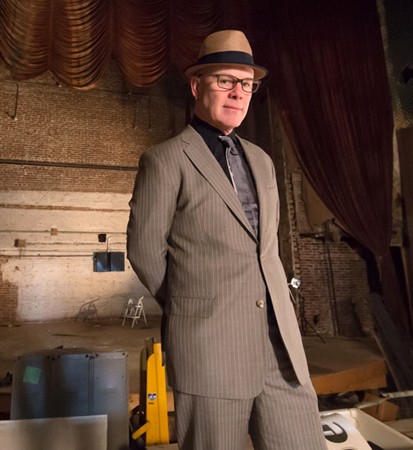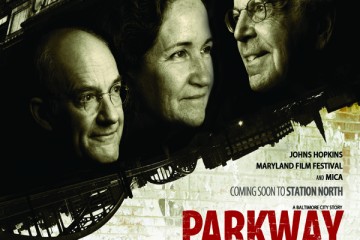Thomas Dolby, creator of the memorable 1980s synthpop anthem "She Blinded Me With Science," will join Johns Hopkins University's faculty as the first Homewood Professor of the Arts.

Image caption: Thomas Dolby tours Baltimore's Parkway Theatre, which is currently being renovated.
Image credit: Larry Canner
Since the debut of his hit single in 1982—which peaked at No. 5 on the U.S. Billboard chart—Dolby, now 55, has been at the forefront of digital music, pioneering ways to merge the music with film, technology, and science. At Johns Hopkins, starting in the fall, he will be teaching "Sound on Film," a collaboration between Homewood's Film and Media Studies program and Peabody's Recording Arts and Sciences program, in which students create soundtracks for films.
Dolby will also be the artistic director of the Program in Sound on Film at Station North, helping to lead the university's efforts in Baltimore's blossoming arts and entertainment district.
"This is a really thrilling opportunity to me. I love the city, I'm fascinated to meet the Johns Hopkins students and I know that they are a really interesting bunch, very, very committed but also very willing to stretch out," said Dolby, whose father, grandfather, and great grandfather were all professors at the University of Cambridge. "It's going to be great to take my place in the faculty that already has a huge range of skills experience and to bring something very new to the table."
Katherine Newman, dean of the Krieger School of Arts and Sciences, calls Dolby's arrival a "major event" for Johns Hopkins.
"He is an extraordinary musician, composer, and technology guru," she said. "His creativity will infuse our Film and Media program as it moves to its new home in Station North, attracting the attention of the electronic music community and the television/film industry. And he will add strength to the Krieger School's faculty as they work with Peabody colleagues to re-create the music major."
With the 1982 release of his first album, The Golden Age of Wireless, Dolby became an unlikely pop star. His quirky video for the single "She Blinded Me With Science" was played in heavy rotation in the early days of MTV. In The New York Times, Stephen Holden once called the single a "pop tone poem."
Dolby released four acclaimed albums in the first 10 years of his solo career. The last of these, 1992's Astronauts and Heretics, was one of the first major studio albums to be completely engineered using a Macintosh home computer.
In 1994, Dolby founded Headspace, Inc. and created the Beatnik audio engine, an early software synthesizer. The product was designed as a component for video games, and Dolby immediately saw its potential for use in early web browsers. While working with the founders of Netscape, Dolby licensed Beatnik to Sun Microsystems for use in the Java programming language. Beatnik came to the attention of Nokia engineers, who sought a sound solution for their mobile phones. Ultimately, ringtones proved the most robust market for the Beatnik audio engine, and by 2005 Dolby's technology was in more than half of the world's mobile phones.
Over two decades, Dolby adapted his musical vision to feature films, video games, and electronic sound technology. He has written scores for films by Ken Russell and Richard Brooks, and his music has been featured in dozens of films and television shows, from "Mission Impossible III" to "Breaking Bad."
Dolby served as musical director for the TED (Technology, Entertainment, Design) conferences from 2001 to 2012. Last year, he toured the U.S. performing a live soundtrack to his award-winning documentary short, The Invisible Lighthouse, which he shot, scored, and edited himself.
"Thomas Dolby's superlative skills as composer, musician, sound designer, and filmmaker will enrich a number of fields at Hopkins and the Peabody Conservatory—from film and media studies to recording arts to computer science to business," said Peabody Institute Director Jeffrey Sharkey.
Dolby's appointment is made possible in part due to a grant from the Andrew W. Mellon Foundation. Last year, the foundation gave Johns Hopkins $1.2 million to launch a collaboration between the Krieger School of Arts and Sciences and the Peabody Institute—the Interdisciplinary Program in Music—and to support initiatives aimed at strengthening the integration of the arts into academic life.
"We are enormously grateful to the Mellon Foundation and the Faxon fund for practicing artists for supporting Krieger and Peabody," Newman said, "and for helping us attract Dolby to Baltimore and to his new home at Johns Hopkins."
Humbled! 'Singer named Johns Hopkins' 1st Homewood professor of the arts http://t.co/0c5ZPRiJ0G
— Thomas Dolby (@ThomasDolby) March 1, 2014Posted in Arts+Culture
Tagged music, film, thomas dolby








